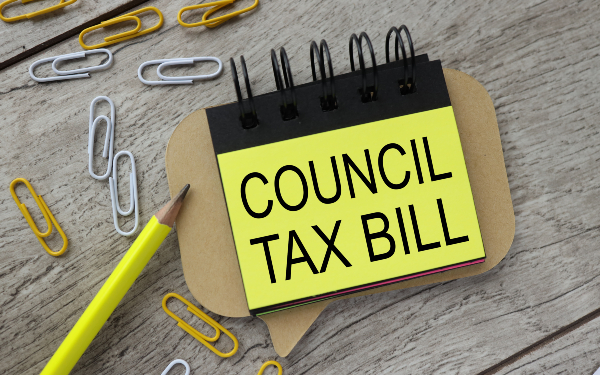
The government has let six English councils with responsibility for social care increase council tax rates by more than national limits this year.
Birmingham, Bradford, Newham, Somerset, Trafford and Windsor and Maidenhead will be able to increase levies by more than will the other 147 social services authorities; the latter would need the approval of citizens through a local referendum to raise rates by 5% or more.
Bradford will be allowed to raise council tax by 9.99%, Newham and Windsor and Maidenhead by 8.99%, and Birmingham, Somerset and Trafford by 7.49% in April 2025 without a referendum, said deputy prime minister Angela Rayner this week.
Tax rises ‘to prevent financial distress’ for councils
The authorities had all requested “exceptional financial support” , a system by which councils can receive government aid – usually in the form of loans – to address funding pressures they consider “unmanageable”.
In a statement to parliament setting out the finalised local government finance settlement for 2025-26, Rayner said the decision was taken to help “prevent these councils falling further into financial distress” and on the basis that they had “amongst the lowest levels of council tax” in the country.
Think-tank the Institute of Fiscal Studies (IFS) said five of the six authorities had council tax rates for Band D properties that were in the lowest quarter, nationally, though Somerset’s was above average. The South West authority said it was facing a £66m funding gap in 2025-26, driven chiefly by social care pressures, and that the additional council tax increase would not fill be enough to fill this.
‘A substantial cash-terms increase’
According to the IFS, if all authorities increased council tax by the maximum permitted without a referendum, funding for English councils would rise by £4.3bn in 2025-26, which it described as a “substantial cash-terms increase”.
Authorities will also be able to make use of an extra £1.1bn through a new scheme designed to charge producers for their use of packaging. Excluding £470m allocated to help councils meet the costs, for their own staff, of April’s rise in employer national insurance contributions (NICs), the IFS said this amounted to a maximum 6.4% rise in resource for authorities in 2025-26, after taking account of inflation.
However, local government leaders said the funding was not sufficient to address pressures, particularly in social care, driven substantially by the costs of compensating care providers for the rise in employer NICs and this year’s 6.7% increase in the national living wage (NLW).
Funding ‘falls short of what is desperately needed’
Local Government Association chair Louise Gittins said: “Extra money for councils next year, including compensation for employer national insurance contributions increases, will help meet some of the cost and demand pressures they face but still falls short of what is desperately needed to cover them all.”
The settlement includes a £270m children’s social care prevention grant, to help roll out family help services and implement a new duty on councils to offer parents a family group decision making meeting whenever they are considering issuing care proceedings for a child.
It also comprises an £880m top-up for the social care grant, which covers both children’s and adults’ services, while authorities will be able to raise council tax by 2% specifically to fund adult social care.
The Association of Directors of Adult Social Services (ADASS) has calculated that these two measures combined would raise about £1.2bn extra for adults’ services in 2025-26 – well short of the £1.8bn in extra costs they have calculated that authorities are facing.
‘Substantial overspending on social care and homelessness’
In its response to the settlement, the organisation representing the capitals’ boroughs said they were facing a funding gap of £500m in 2025-26, despite the settlement, driven by social care and homelessness services.
London Councils said that boroughs were facing overspends of £180m on adult social care, £150m on children’s social care and £270m on homelessness services in 2024-25.
“We are dealing with a range of immense challenges in London, but the worsening homelessness emergency represents the biggest single risk to borough finances,” said London Councils chair Claire Holland.
“The impact of homelessness on Londoners – especially families with children – is devastating, and the costs to boroughs are utterly unsustainable.”
Mixed views on government approach to funding
The County Councils Network (CCN) said the costs of the employer NIC and NLW rises outweighed additional funding received through the settlement for the shire authorities it represents.
It also took aim at the government for redirecting money away from these areas through a £600m ‘recovery grant’, the distribution of which was based on deprivation levels, which ministers said were a proxy for population need.
In her statement, Rayner described this is the “first meaningful step” towards reforming funding based on “an up-to-date assessment of councils’ funding needs and financial resources”, which would be implemented from 2026-27.
The grant was welcomed by metropolitan councils’ body the Special Interest Group of Municipal Authorities (SIGOMA), which said it would “provide welcome relief to the most deprived areas after a decade of disproportionate cuts and increases in demand”.
However, the CCN, whose members are receiving just 3% of the recovery grant, has argued that significant areas of need are not fundamentally driven by deprivation.
Social care and SEND demand ‘key drivers of need’
“The CCN’s evidence shows that demand and market failure across adult and children’s social care and special educational needs services are the main reasons as to why councils across all four corners of the country are struggling,” said its finance spokesperson, Barry Lewis.
“If the trend of this finance settlement does continue, the government will completely understate the very real financial pressures faced by councils outside of towns and cities and it will push many county and unitary councils to the brink.”
The news comes with the government having announced its intention to replace existing two-tier (county and district) councils by unitary authorities and replace small unitaries with bigger bodies, in order to boost value for money and clarity of service responsibility for citizens.
Various groups of councils have come forward with proposals for reorganisation already and the government is planning to create some of the new unitaries during this parliamentary term.







 Bournemouth, Christchurch and Poole
Bournemouth, Christchurch and Poole  Hampshire County Council
Hampshire County Council  Oxfordshire County Council
Oxfordshire County Council  South Gloucestershire Council
South Gloucestershire Council  Wokingham Borough Council
Wokingham Borough Council  Webinar: building a practice framework with the influence of practitioner voice
Webinar: building a practice framework with the influence of practitioner voice  ‘They don’t have to retell their story’: building long-lasting relationships with children and young people
‘They don’t have to retell their story’: building long-lasting relationships with children and young people  Podcast: returning to social work after becoming a first-time parent
Podcast: returning to social work after becoming a first-time parent  How managers are inspiring social workers to progress in their careers
How managers are inspiring social workers to progress in their careers  Workforce Insights – showcasing a selection of the sector’s top recruiters
Workforce Insights – showcasing a selection of the sector’s top recruiters 

 Facebook
Facebook X
X LinkedIn
LinkedIn Instagram
Instagram
Wait for the rest to follow!!!!!!!!!
If the council spent the money on the service’s it is supposed to and stop putting it in pet projects and wasting .money perhaps it will have the cash it needs.